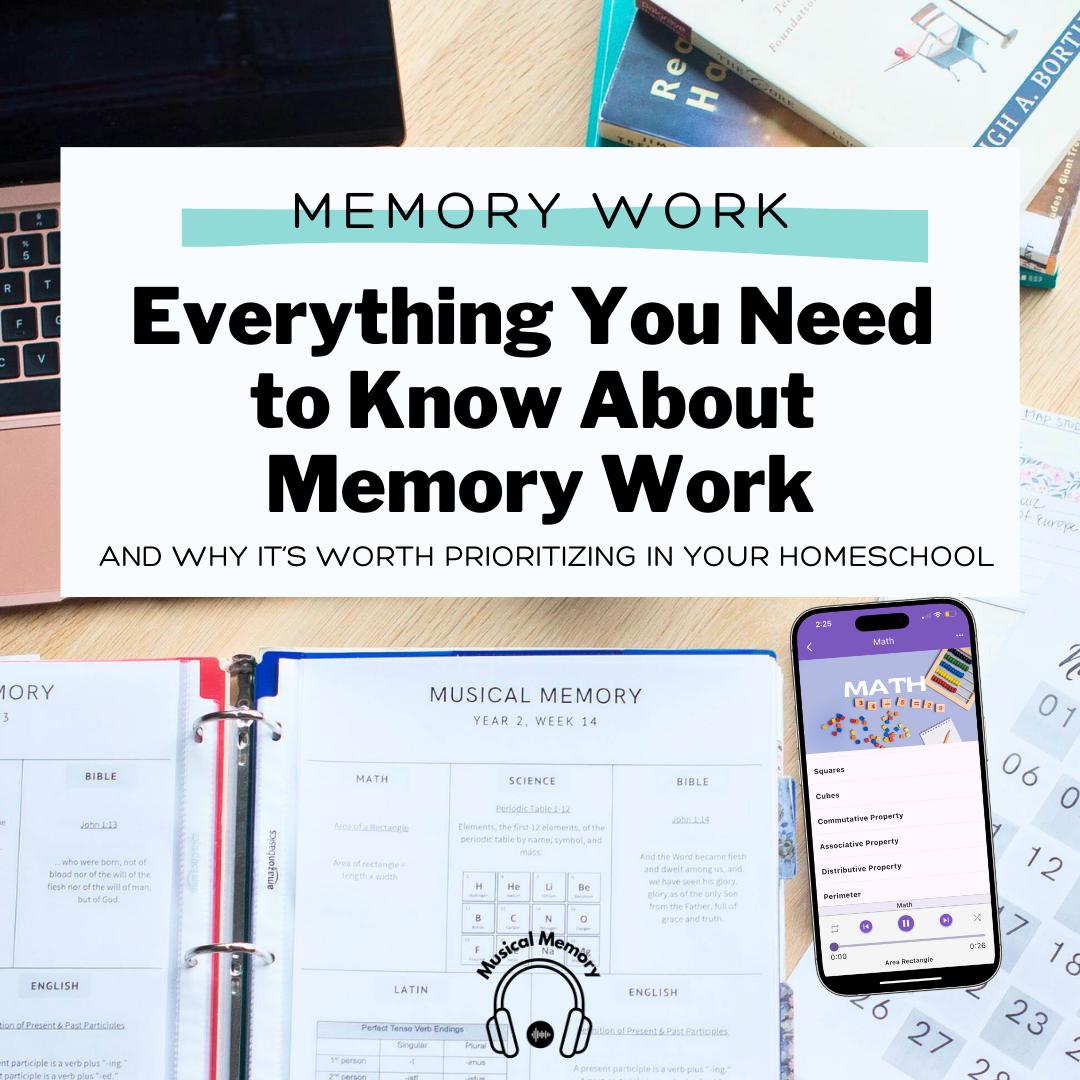Memory work is basically non existent in traditional classrooms. So if you went to a regular school like I did, you might be wondering what the heck memory work is and why many homeschoolers use a form of memory work during the school year. Memory work is simply memorization on purpose. Of course kids memorize all sorts of things easily… song lyrics, quotes from tv shows and movies, jokes and riddles, etc.
But memory work is exactly what it sounds like… intentionally working on memorization.
I first heard about the idea of memory work from my inlaws, who were involved in Classical Conversations – a classical education style organization that has local co-ops all over the U.S. I read the book The Core, by the Classical Conversations founder, Leigh Bortins, and she argued for a return to the idea of a “grammar stage,” in elementary school education. She (and many others in the last 100 years), stated rote memorization of basic facts is not bad for children as more modern education methods suggest. Rather, younger children memorize quickly & easily. They enjoy it. Memory work is a great way for young children especially to get the language of complicated subject areas into their minds. The mind will naturally create proverbial file folders of this information and begin to categorize and synthesize it and give children a framework for future studies.
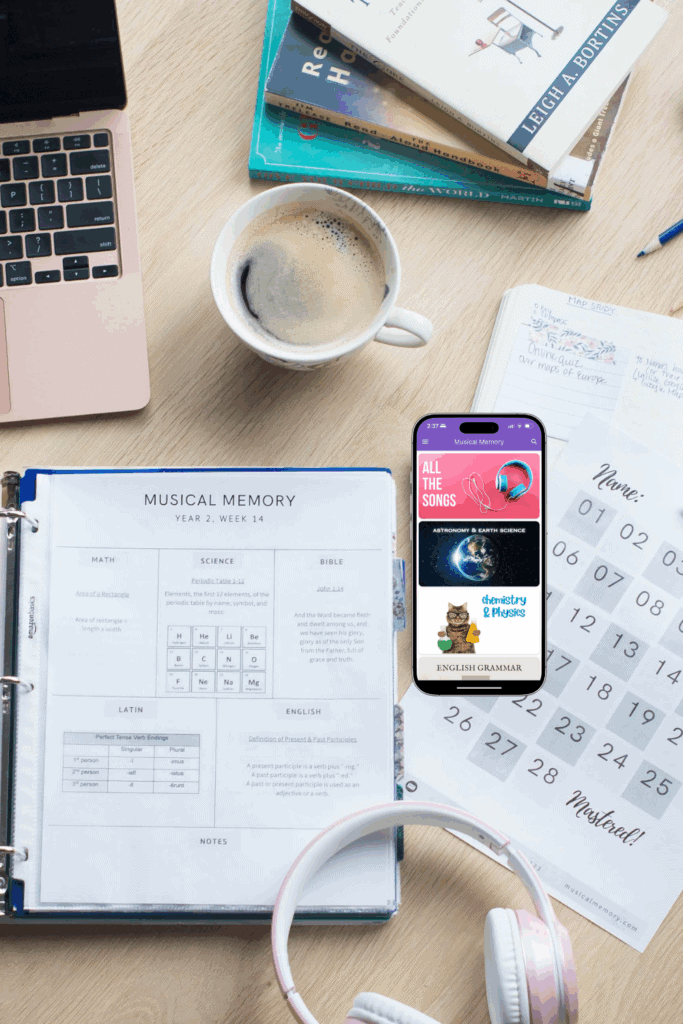
In our home, we first started memory work because of that book. The book made sense to me. I had been a classroom student and classroom teacher, I’d been a long time piano student and a piano teacher and I could see that while memorization isn’t the end all be all for learning, it seemed to have the potential to be a good thing. And at the very least it wasn’t going to cause any harm.
12 years later, I’ve written an entire memory work program where ALL THE FACTS, FORMULAS, FIGURES & SENTENCES are put to short & catchy songs. (Sorry for shouting, but I genuinely love this program.) Ha! If you’d have told me that’s what I’d be doing when I first read that book, I would have been very confused.
But here’s what I found when I was trying to do memory work with my own young children…
1. Memory work has a TON of benefits.
I have a whole separate post on this topic because I’ve grown passionate about it. But having homeschooled our 4 older kids for the past 8 years (and spending many years prior to that teaching & studying education), I’m 100% convinced that a few minutes a day spend memorizing on purpose is a worth while use of your homeschooling time.
And I am a VERY no-fluff homeschooler. We don’t do any busy work in our homeschooling. My kids have tons of free time throughout the week to pursue their own interests and studies. But, we do use the Musical Memory app daily in our morning time, and spend time memorizing poetry as well.
2. Kids can memorize a lot more quickly, easily, and enjoyably if the subject material is in a song.
We all know this to be true. Think of songs you haven’t sung in 20 years… commercial jingles from the 1990s, School House Rock songs, theme songs to old tv shows. You probably hadn’t sung a children’s lullaby 20 years prior to having your own kids and you might not even remember learning them. I have no recollection of my mom singing Jesus Loves Me as a child… it’s just like I always knew it.
Music is powerful in its ability to sink into the mind forever, and your mind can hold a seemingly infinite number of tunes and rhymes and mnemonic devices.
Plus, memorization is a muscle. Children are naturally wired to memorize more quickly than adults. (That’s a different neuroscience topic for a different day.) However, adults and older kids can increase their memorization capacity and muscles with practice too.
I’m amazed at how much more I can memorize now than 9 years ago when I started on this journey with my first little preschooler.
3. It’s hard to find good memory work programs that are open-and-go.
Now the truth is, you don’t need a memory work program to start memorizing. You can just pick things you want your kids to learn and go from there. One of my favorite books to give new homeschoolers is Cindy Rollins’ book, Morning Time. The back of this book is FILLED with ideas about what to memorize and ideas about how to memorize. I interviewed Cindy on my podcast and really value her wisdom and methods.

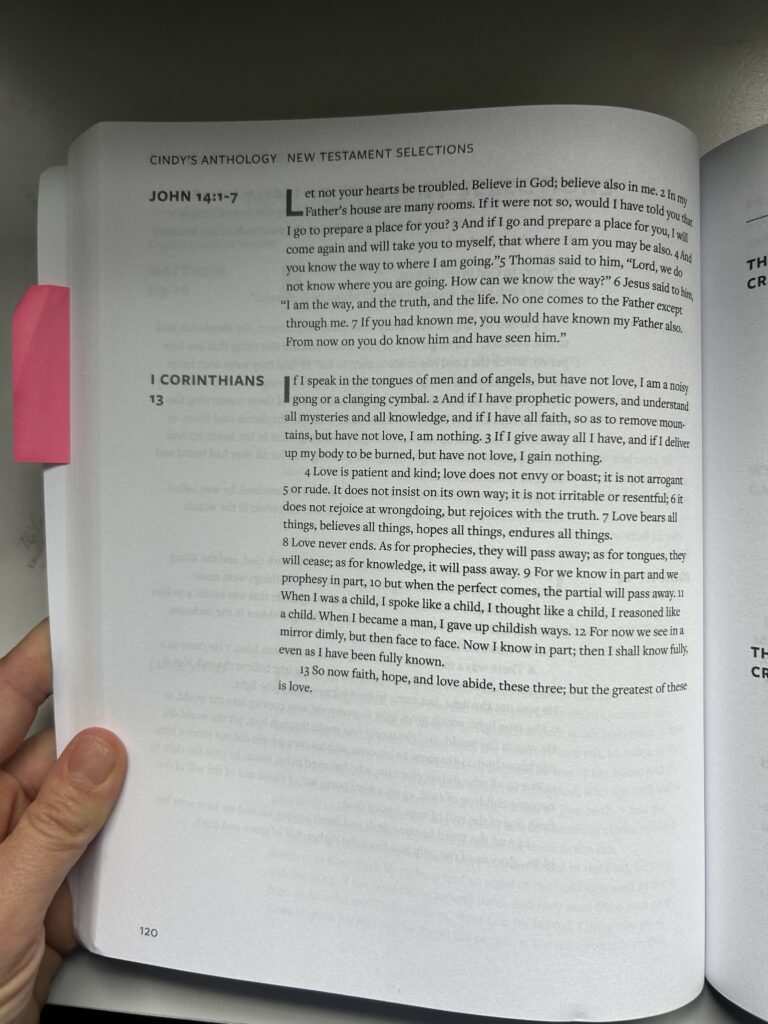
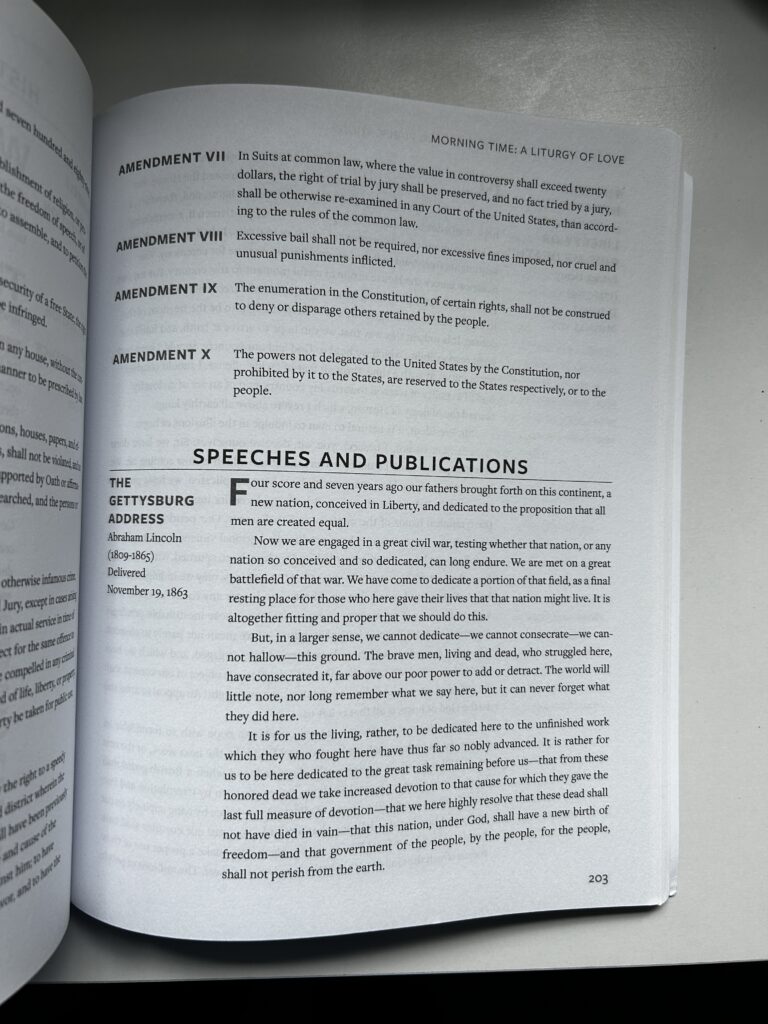
When we started homeschooling, we had 3 kids under 4, which quickly turned into 4 kids under 6. So, I really wanted something I could put on auto-pilot.
After a few years of trying to curate memorization playlists and find Youtube songs for random math formulas (only to have to watch ads and end up singing obnoxiously long songs), I started making up my own songs just in our home. I have a music background and would randomly make up songs as a child or sing my way through menial household chores. It’s funny to see that quirky habit come full circle.
I ended up partnering with a local classical homeschooling hybrid program to write their memory work curriculum and eventually, Musical Memory evolved into what it is today.
So far, Musical Memory has 5 subject areas. 3 annual cycles. Subject by subject playlists. An easy-to-use app with printable lyric guides, progress-tracking charts, coordinating booklists, and copywork for Bible verses.
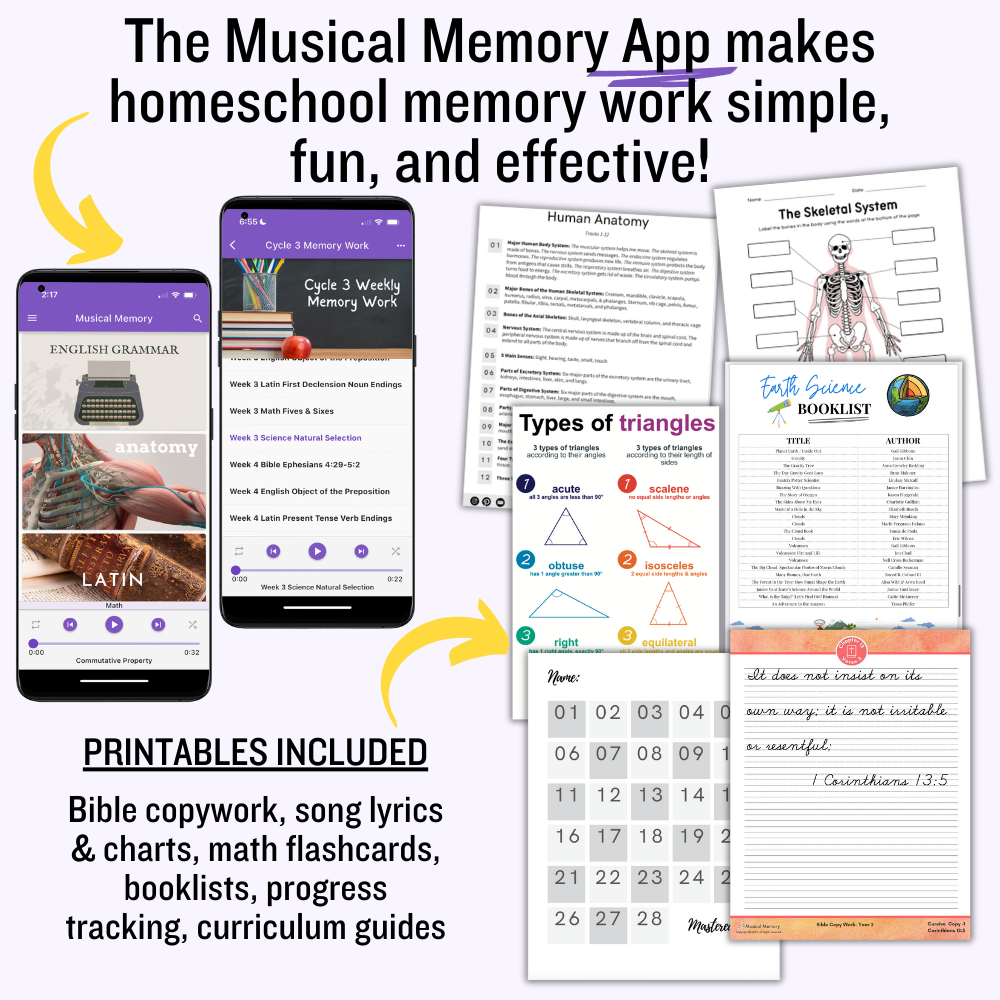
I know I’m biased, but I’ve looked at a TON of memory work programs out there and I truly think ours is the best one. It’s by far the simplest to use.
The Musical Memory app is such an easy way to incorporate Memory Work into your homeschool with spending much time trying to figure out what to memorize and how to organize everything.
You can start a month-long free trial, which gives you time to poke around and see if it’s a good fit for you!!
This video gives you a quick overview of the app.
As the video explains, you can choose individual subject areas to work on or you can choose one of our 3-year-cycles. You can mix and match however you want because you’re the boss in your homeschool.
Every single song from every subject playlist is spread out over the 3-year-cycles. If you love details, the spreadsheet image below is for you. It’s the curriculum map (aka: scope and sequence) of our entire program.
Musical Memory Subject Areas Include: English Grammar, Science, Latin, Math, Bible.
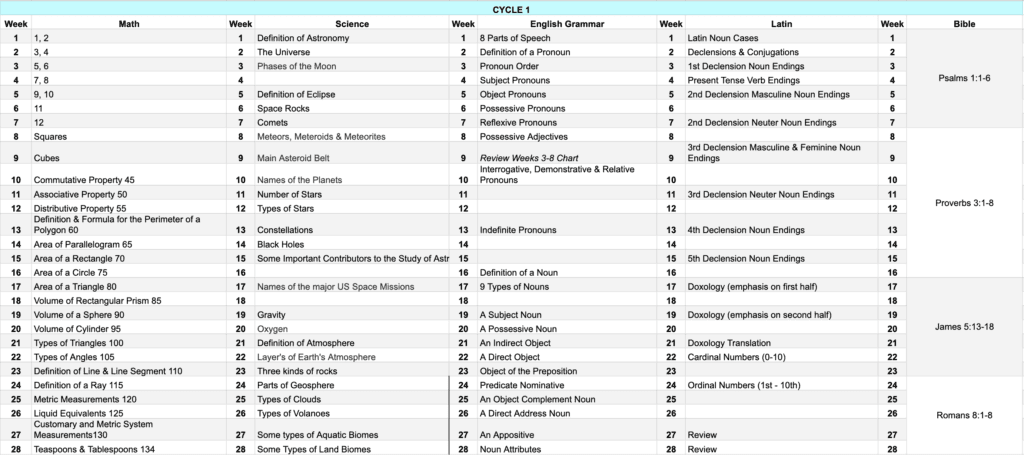
What to Memorize
Well, you can memorize anything!! And you can’t memorize everything.
When I first started homeschooling, I was always looking for the “best.” The best curriculum, the best reading instruction, the best educational philosophy, the best pencils, erasers, booklists, etc. I was so afraid of not giving my kids a “good enough” education.
But over the years, I’ve talked to countless experienced homeschool moms, met the neatest young adults who were homeschooled and realized there isn’t one right way to educate a child. There are timeless principles of thinking and learning, and I do enjoy thinking about the problem of mass schooling.
With your own kids, in your own home, though… the possibilities are endless.
In fact, the unique ability to tailor your child’s educational experience to him or her individually; the opportunity to weave your own interests and passions into your home education while also giving your child a world of possibility to find their passions and interests; the chance to take all the rabbit trails & deep dive into topics that could never be covered in a one-size-fits-all classroom… the individualization is one of the best things about home education.
So- stop looking for the best. Find what works for you and run after that. Your kids will likely memorize the things that interest them anyway… be it airplane models, dinosaur facts, or in my 10 year old’s case… anything and everything you’d ever want to know about guinea pigs.
In terms of academic memorization, I’ve come to believe there is true value in memorizing a few basic facts, formulas, and definitions across multiple academic disciplines. Just as you’d have a child memorize multiplication tables for math, you can memorize grammar terms and science terms as building blocks for long-term critical thinking & application in any subject area.
As I mentioned, Musical Memory includes Math, Science, English Grammar, Latin, and longer Scripture passages. I worked with subject area experts to help me create kid-friendly definitions that fit within a framework of the subject area. We made sure that the chosen songs covered what experts in that topic consider “the basics.”
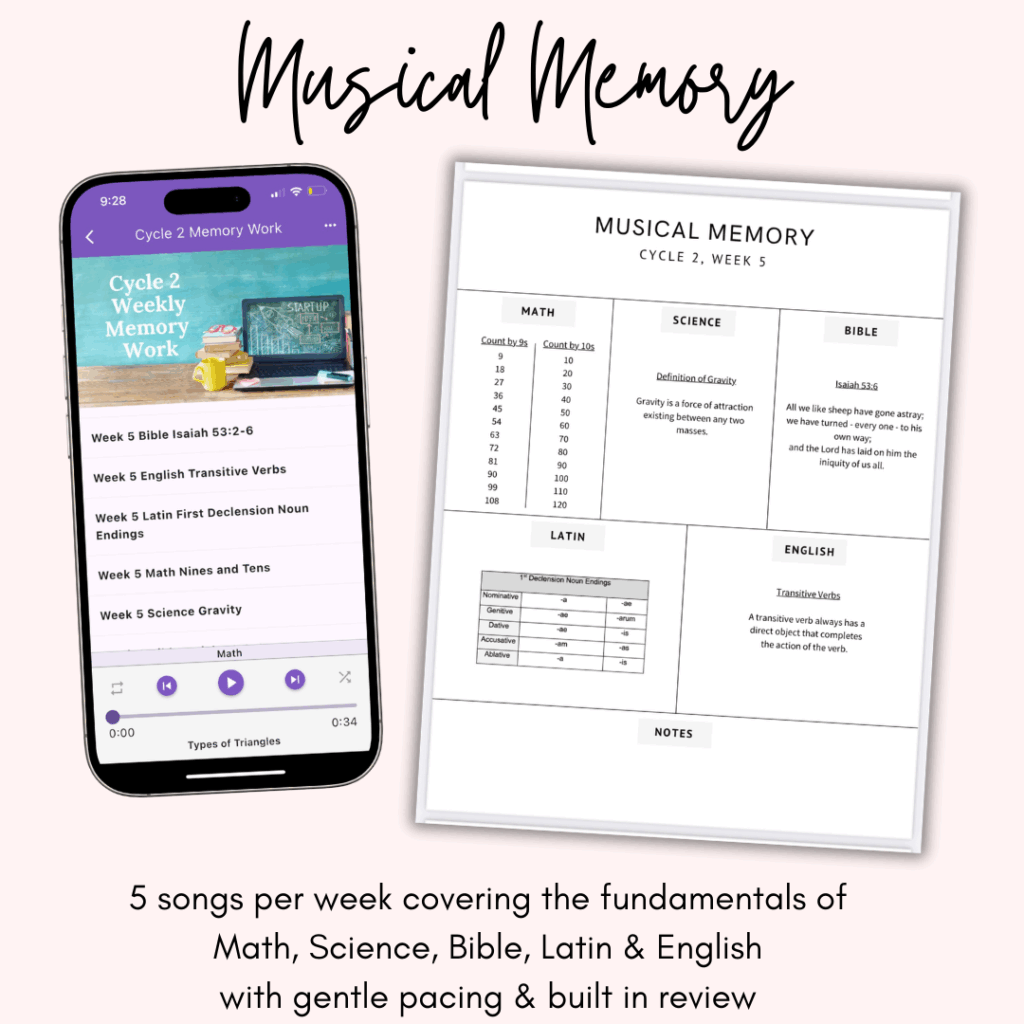
History Memory Work
The aforementioned book, Morning Time, is a great reference for History memorization. Many history homeschool programs also include their own memorization suggestions. Because of that, and because there are already great songs for a World Events Timeline, Historical Events, and early United States historical documents, I chose to focus on other subject areas first. Someday, maybe I’ll add history songs to my repertoire.
I also do think that history is different in that it’s an endless story & the topics of importance somewhat depend on where you live. Of course there are some events that have been influential worldwide and I do enjoy using a world-history spine and reading about world history. But overall, to me, it felt much more subjective to boil down the most important history facts as opposed to the most important math formulas. History is best studied in story & context, but we do use the following history songs & memorization in our own homeschooling:
- Classical Conversations Timeline Song – it’s on Youtube; it’s LONG. We used to always start at the beginning but we’d never make it at the end. Now, I focus on one section per semester and rotate through the whole song over the course of 2 years. It’s about 13 minutes long, so that’s an approximately 3 minute chunk each semester!
- Veritas Press – Timeline songs unique to each of the 4 time periods they have coordinating curriculum for: Old Testament & Ancient Egypt; New Testament, Greece & Rome (my kids loved this one!!); Middle Ages, Renaissance & Reformation; 1850s to Present;
- Veritas Press – They have a ton of random memory songs – presidents, states and capitals, etc.
- Gettysburg Address – by King Things; on Youtube or Spotify.
- Declaration of Independence – on Youtube; this one is cute because it’s done by a group of homeschool kids. It’s very well done, but it only has the first part of the declaration in it, not the whole thing.
- Preamble to the Constitution – on Youtube; originally from SchoolHouse Rock. I remember learning this in 5th grade – haha – and I still know it!
- History Sentences – Classical conversations has great history sentences!! I don’t think these are essential, but they’re pretty fun and well-done. I especially enjoy pairing history sentences with a good book! They’re all on Youtube too. Ancient History, Medieval/ Renaissance, United States.
- Presidents – Several songs on Youtube or Spotify
Memorizing with Preschoolers & Kindergarteners
I use Musical Memory with my preschoolers. It’s AMAZING how much little ones can pick up. And I’ve heard countless adorable stories from families who use our programs that their 3-5 year olds are singing all of Psalm 1, Romans 8, and their Latin declensions. It’s hilarious & adorable, but also has immense long-term benefit. Definitely play Musical Memory songs for your preschoolers.
But there are a few other essentials for this age group – counting & calendar & nursery rhymes.
There have been studies done on the benefits of nursery rhymes for children! They’re so beneficial. You can really just pull out a great Mother Goose book and start reading. Your 2-4 year old will want to hear the silly rhymes over and over, especially if it’s well-illustrated.
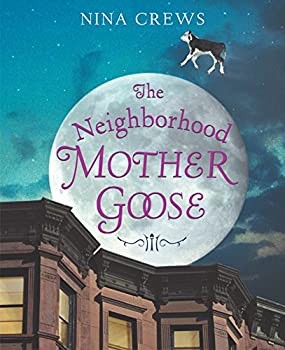
But you can also use songs to memorize other important preschool concepts. Here is a link to my Spotify Preschool Playlist (song ideas listed below in case you want to make your own playlist on a different platform).
- Days of the week
- Months of the year
- Books of the Old Testament
- Books of the New Testament
- Counting to 20
- Counting backwards from 20
- ABCs
- Silly Songs! I love Laurie Berkner for non-annoying kids music. You can also do hand motions to songs like Wheels on the Bus, and Head Shoulders Knees and Toes. Little ones love that!
- Other Scripture Memory Verses
Poetry Memorization
Poetry memorization, like all memory work in our homeschool, was something I started out doing because someone convinced me it was worth while. And I’ve been SHOCKED by the benefits of it… becoming a HUGE believer in the value of poetry memorization.
We use IEW’s poetry memorization program because it’s so easy! I love a resource that can be used for a long time with multiple kids and this could easily cover Kindergarten through high school. We’ve been using it for 5 years now and I recommend it to EVERYONE.
I begged IEW to let me become an affiliate & invited Andrew Pudewa on my podcast because I’m a huge fan of their programs. He and I had a great conversation about language arts for little ones in general, but we talked about poetry for a while. He told me his Poetry program is his favorite thing he’s created, and I have to agree.
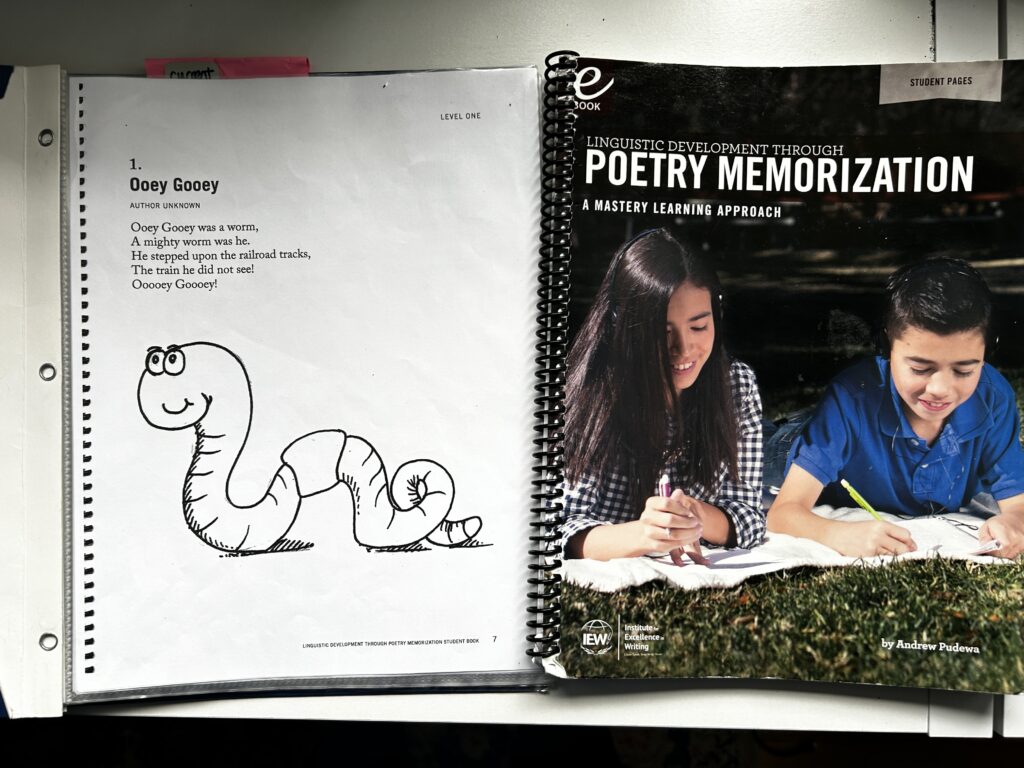
own spiral book.
There are 4 different levels in the program that can be used with any age student. Truly!! The program goes from “Ooey Gooey Was a Worm” to Shakespeare sonnets and the Gettysburg Address. Some selections are by famous poets like Robert Louis Stevenson; others are more hidden gems.
Benefits of Poetry Memorization
I could go on and on about poetry, but this free 1-hour lecture by Andrew Pudewa covers it more eloquently. I highly recommend listening to this on your next walk.
All 4 of our school-aged kids have and I have grown to love poetry through memorizing it.
Plus, memorizing poetry helps store sophisticated vocabulary and language patterns in the mind.
Poetry and famous speeches are great ideas for older students (even high school students) to work on their memory too! Strengthening the memorization muscle is a skill that people at any age can work on.
Memory Binder
I print the Musical Memory work for the year and pop it in a binder for easy reference. Since we’ve used it for years, I now have a binder with all 3 cycles’ worth of information. Whenever we memorize an extra scripture passage, I add that to the binder too.
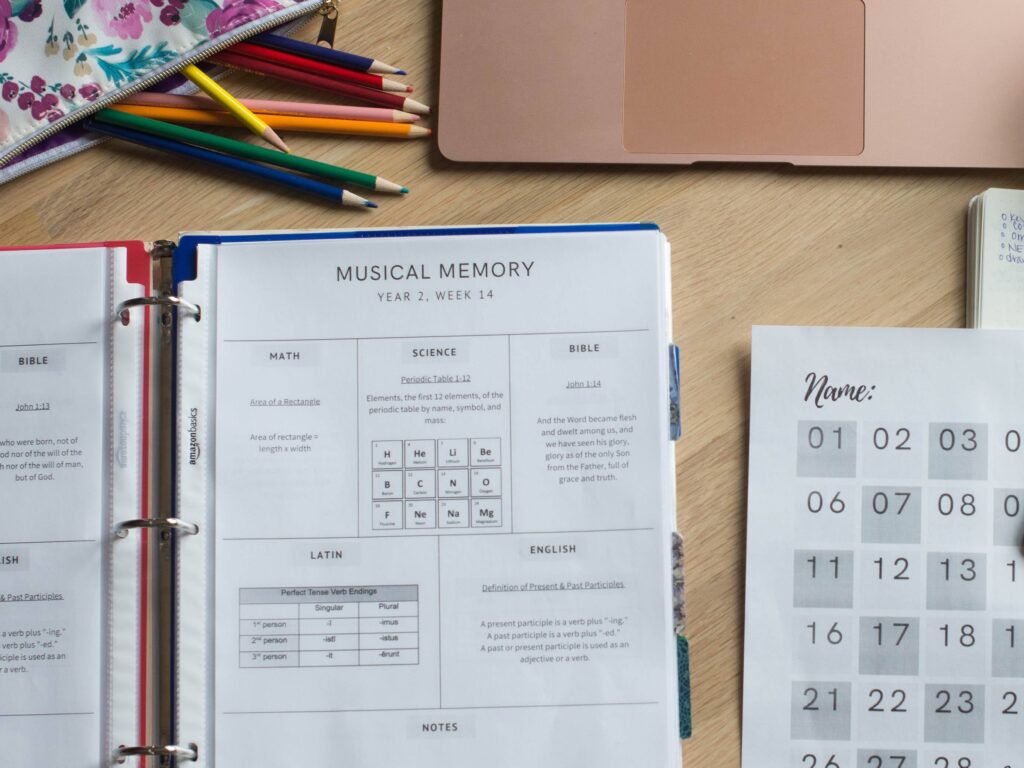
Truthfully, I wish I was better at remembering to review all our past memory work (especially past longer Bible memory passages), but I’m not. Anything that we sing sorta just sticks forever! And the important facts that get used all the time eventually end up in kids’ long-term memory as well.
Be it facts, formulas, scripture, or poetry… I really believe the discipline of memorizing is sinking the true, good, and beautiful down into our hearts & minds. It will yield fruit for years to come.
Don’t Let Perfection Be the Enemy of the Good
One more word of encouragement on memorizing… just start.
Pick something and start with 5 minutes a day and see what happens. Download our app, choose a playlist and let it play for 5 minutes a day.
Print out your favorite Bible passage and read the first verse with your kids 3 times in a row one day. Then do it again the next, and the next. Once everyone knows it from memory, add the next verse. It really can be that simple.
Over time, you’ll see the seeds of beautiful language, heart-transforming words, and amazing knowledge get planted in the hearts and minds of everyone in your family. The fruits of this are seen in the long haul.
Just start small and let it grow over time, little by little.


